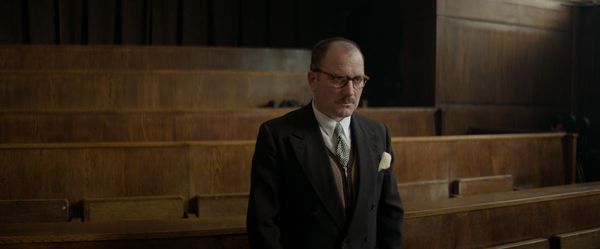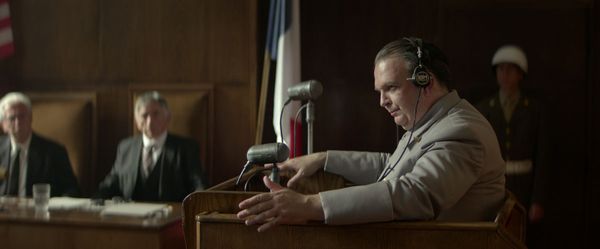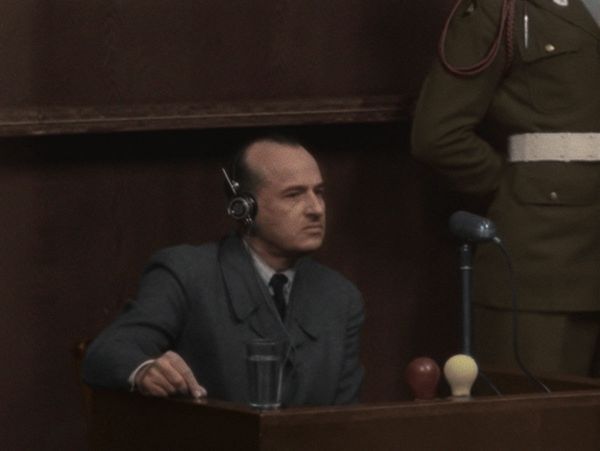
Whenever Joe Berlinger makes a docuseries, he told me in a recent conversation, he always looks for the social justice angle. He asks himself, what needle can I move? That answer might be obvious when it comes to his latest project, “Hitler and the Nazis: Evil on Trial” . . . but don’t be so sure.
There’s no shortage of Adolf Hitler profiles or examinations of World War II in the totality of film and TV. Fewer view the rise of the Third Reich through the framing of the Nuremberg Trials, and as Berlinger points out there are fewer probes into the origins that led to the atrocities committed on the Eastern front, where Hitler sought to enact his version of expansionism known as Lebensraum, and where much of the focus of the six-episode series is concentrated.
"The war in the West was, by many criteria, a very normal war," Berlinger explained in our video chat. "The atrocities were in the East. Lebensraum was in the East. Racial superiority was in the East. Most Americans are familiar with the war in the West, because that's where we sent our soldiers. But what happened in the East is much less known and is much more important to drawing parallels to today."
But when Berlinger mentioned emphasizing social justice in his work, the examples he cited were 2019's “Conversations with a Killer: The Ted Bundy Tapes” and its fictionalized counterpart “Extremely Wicked, Shockingly Evil and Vile.”
“I know this sounds like a strange comparison,” he admitted. At the time the films premiered, he was criticized for giving more exposure to a vile criminal who took pleasure in murdering young women. Berlinger saw it differently, explaining that when he told his daughters, who were then in college, that he was working on these projects, they had no idea who Bundy was.
“The fact that he preyed upon young, collegiate women who fell victims of trusting somebody because they were white and good-looking and charming — that's the lesson I want to put into the world for my daughter's generation,” he said. “By the same token, the statistics of how ignorant people are about the Holocaust, these demagogues of today who have normalized hate and the impact that's having on young people, I felt like I wanted to reach a younger demographic with this show.”
“So how do you do that?” he asks. “You embrace the tools of cinema that they’re used to.”
Although “Hitler and the Nazis” uses audio and limited video from Nuremberg to establish the facts concerning Nazi atrocities, the primary voice tracking Hitler’s rise is that of journalist William L. Shirer, a foreign correspondent for CBS News and Hearst’s wire service who was stationed in Berlin between 1934 and December 1940.

Berlinger uses recordings of his radio broadcasts along with an AI-generated version of his voice, which was done with his family’s blessing, to walk us through this history from a humanistic and very personal perspective instead of simply traveling through headline events or battles.
Through Shirer’s testimony and presenting the Nuremberg Trials via a combination of colorized film footage and dramatic reenactments, Berlinger sought to make “Hitler and the Nazis” what he calls “a present-tense experience.” The trial is his nod to the audience’s familiarity with true crime structure, representing the search for the truth in what he rightly calls “this era of anti-truth” through witness testimony.
At Nuremberg, the star witnesses were also Hitler’s collaborators, including Rudolph Hess and Hermann Göring. Many were honest without expressing remorse, attempting to push all blame onto Hitler who, conveniently, wasn’t there to defend himself, having committed suicide in his bunker.
Berlinger’s use of actor portrayals to bring moments of the testimony to life where only audio exists lends a continuity to the court scenes, and his use of technology and colorization to update footage of life at that time helps modernize the content. The only segments he intentionally refrained from colorizing are the footage of the atrocities uncovered by the Allies at the concentration camps, keeping them in black and white out of respect for the victims.

Berlinger grew up in Westchester County, New York, in a very secular Jewish family. His father’s family immigrated from Germany in the 1850s and his mother’s from Poland around the same era. As far as he knew none of their immediate relations were left behind. “We weren’t a family that was really affected by the Holocaust,” he said.
He was around 15 years old in 1974 or ’75 when he saw Holocaust liberation footage for the first time. “I literally couldn't get it out of my mind. And I thought to myself, ‘OK, I'm Jewish, but not really, because we're not observant. I'm German, but not really. No one speaks German, and there are no German traditions. But had I been born at that period, I would have been murdered.’ So I just obsessed over it.”
Berlinger majored in German at Colgate University and took a position with an advertising agency in Frankfurt after he graduated in 1983. But he soon left that world for filmmaking, working under Albert and David Maysles for a time.
Studying German culture and living in Germany, he says, helped him “[sort] through all my issues and my feelings, by studying the history and having a better understanding that it's not particularly a German phenomenon, but a European phenomenon. Obviously, I'm not condoning the Germans. They did a terrible thing, but it was part of a larger historical movement which they executed.”
In recent years several studies have revealed a general lack of knowledge about the Holocaust, especially among Millennials and Gen Z, including the most basic facts such as the number of Jewish people who perished.
The 2020 findings of a 50-state survey conducted by Schoen Cooperman Research on behalf of the Conference on Jewish Material Claims Against Germany cites that 63% of all national survey respondents do not know that six million Jews were murdered and 36% thought the number to “two million or fewer.” This comports with similar findings by the Pew Research Center released in the same year.
This speaks to general failures in our educational system, but Berlinger also cites other echoes in our modern discourse.
“I'm looking for touchstones to today,” he said. “I wanted to focus on the psychology of hate and the psychology of where the otherization of people leads to . . . this line of thinking when you vilify other people, when you dehumanize other people, when hate speech is normalized — which is the environment we live in — it leads to this kind of behavior. That's what we need to guard against.”
And the filmmaker doesn’t deal in veiled terms when he specifies to whom he’s referring. Citing his work on another documentary about conspiracy thinking he noticed common links between Trump’s followers and antisemitic rhetoric. “I was noticing that a Holocaust denial, which is bad enough, was turning into Holocaust affirmation – like, ‘Hitler was right.’”
And that dangerous misinformation has moved from the fringe into the mainstream. “You see propaganda replacing news. You see the vilification and blaming of problems on other people . . . You see, disenfranchised white people longing for the times that were better when those times actually never really existed,” he points out.

“But the erosion of the truth, the level of ignorance of a certain generation about these events, the normalization of hate speech — I mean, these things have been happening since 2016,” he said.
The filmmaker adds that his point in making “Hitler and the Nazis” is to wake up the audience to the reality of how extremely fragile democracy is. “It depends upon people with different interests, and beliefs all coming together and set seeing and agreeing upon what is best for everybody, what is the common good,” Berlinger said. “And that is not possible when you've otherized each other, and you divide into camps and hate each other, and you also can't even agree on what the basic truth is.”
Berlinger adds that he’s not here to tell people what the truth is, only to warn that “if you look back at Nazi Germany, you’ll see some echoes.”
“Hitler and the Nazis: Evil on Trial” is now streaming on Netflix.







